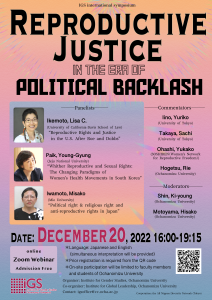2022.12.20 IGS International Symposium
“Reproductive Justice in the Era of Political Backlash”
Women’s bodies are a battleground. To understand how the law, politics, and social movements have worked to enable and/or disable reproduction, Ki-young SHIN organized an international symposium titled “Reproductive Justice in the Era of Political Backlash” on December 22nd, 2022. In her opening remarks, she notes that it was women of color who had coined the term “reproductive justice” in their fight against forced sterilization, highlighting how structural barriers can obstruct one’s right to self-determination.
The first presenter, Lisa C. IKEMOTO, presented three conceptual frameworks that help detangle the current ideological struggle between fetal personhood and women’s bodily autonomy: reproductive health, rights, and justice. Whereas reproductive health focuses on the delivery of healthcare services, reproductive rights ensures that access to such services are protected through law and legislation. Reproductive justice, however, adopts an intersectional approach to address the root causes of oppression –– namely, how structural inequality has worked to stratify reproduction access based on race, poverty, disability, and immigration. These three models operate in tandem with local community organizing efforts to expand access to reproductive health care. Not only has the Dobbs v. Jackson decision to overturn Roe v. Wade criminalized pregnant bodies and medical care, but it has also put other legislation based on the right to privacy, such as sexual privacy, same-sex marriage, and contraception, at risk of a similar fate. “We are in a civil war over abortion” she argued, but the fervor of the Green Wave Movement in Latin America and its influence on feminist movements in the United States can serve as a hope for the future.
The second presenter, Misako IWAMOTO, contextualizes the backlash against reproductive rights in Japan by highlighting the government’s numerous failures to adequately address, compensate, and memorialize both the victims of military sexual slavery during the Asia-Pacific War and victims of the 1948 Eugenics Protection Law that had legalized forced sterilizations and abortions against people with disabilities and transgender people. Against this political backdrop, it is no surprise that the state, rather than providing medical coverage for contraception, abortion, pregnancy, and childbirth, subjects them to consumption tax and strict institutional regulations instead –– in fact, access to abortion still requires spousal consent. Additionally, the coalition between Japan’s ruling Liberal Democratic Party, the Unification Church, and municipal government groups, have worked to delegitimize the work of activists by claiming that feminism and self-determination are “communist” threats to national sovereignty. This political and religious right-wing alliance has blocked separate-surname movements and the promotion of LGBTQIA rights while simultaneously blaming the younger generation for the low birth rate. Lastly, she expressed the dire need for coalition-building as the Unification Church’s current agenda to pass the “Family Education” law, a nationalist reinterpretation of education that educates children to put the family before the individual, is gaining traction and threatening constitutional reform.
During the second half of the event, four specialists provided their responses to the presenters. The first comment was from Sachi TAKAYA who researches reproductive rights for migrant women. Within the context of economic globalization and Japan’s exploitation of migrant women to combat the low birth rate, she raised the question of “reproduction of nation” and how it may pertain to reproductive justice.
The second commentator was Yuriko IINO, who explained that the reproductive health/rights/justice frameworks are not mutually exclusive but are inextricably linked with one another. Considering the recent women’s rights movements in Japan have suffered interventions by insidious conservatism, she warned against a “feminism for the majority” and stressed the need for healthcare expansion to include migrant workers and people with disabilities.
“What comes to mind when you think of ‘justice?” asked Yukako OHASHI, the third commentator.
In Japan, where “justice” is redefined by patriarchal terms, it is difficult for reproductive justice to then take hold when women’s bodily autonomy has historically been undermined by misogynistic and antiquated laws. “My body, my choice,” she argued, but that can only be realized until feminism becomes intersectional by forming coalitions and including transwomen.
Lastly, Rie HOGETSU explained how Japan’s current criminalization of abortion is a remnant of post-modern policies on population control, which she defined to be a manifestation of biopolitics –– a method of control firmly linked to influencing people’s behavior through soft power. Because this is further expressed through the pro-life or pro-choice debate, she advocated for an education reform that can redefine what constitutes self-determination to avoid instilling individualizing narratives within women’s consciousness.
Finally, through questions pertaining to challenges for Asian American solidarity and the medical establishment in Japan, the Q&A session reaffirmed the need for international cooperation and intersectional approaches to reproductive justice.
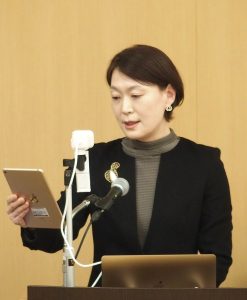
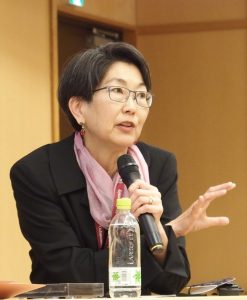
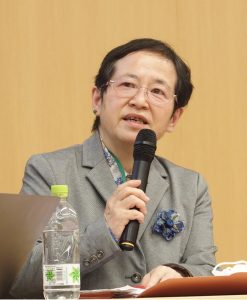
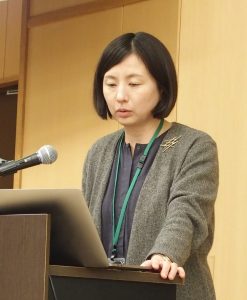
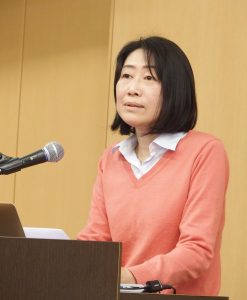
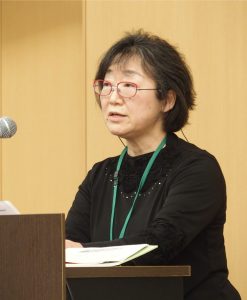
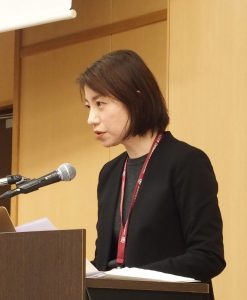
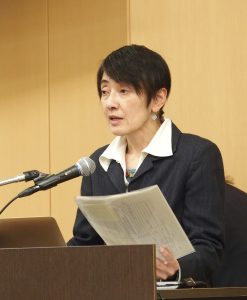
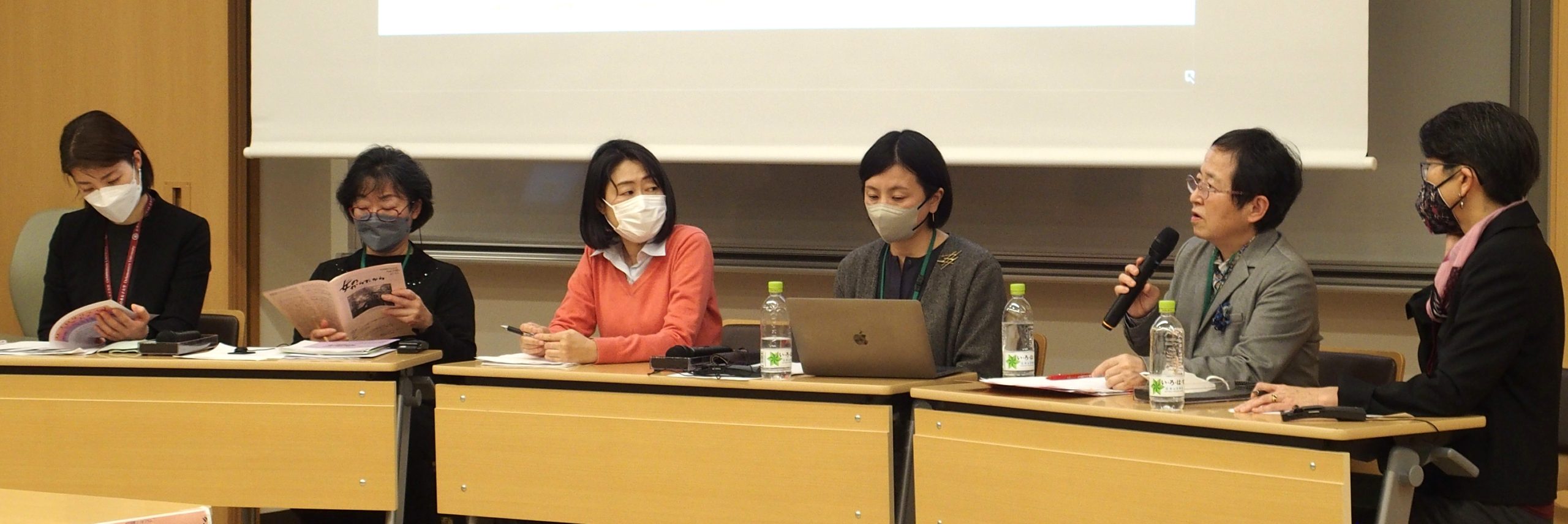
Misha CADE (Ph.D. Student at The University of Tokyo, Graduate School of Arts and Sciences)
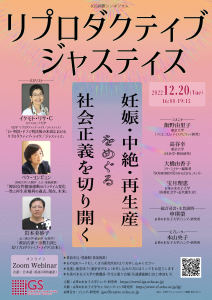 《Event Details》
《Event Details》
IGS International Symposium “Reproductive Justice in the Era of Political Backlash”
【Date/ Time】Tuesday, December 20th, 2022 16:00-19:15
【Venue】Onsite+Zoom Webinar
【Presenter】
IKEMOTO, Lisa C. (Professor, University of California-Davis)
“Reproductive Rights and Justice in the U.S. After Roe and Dobbs”
IWAMOTO, Misako (Professor, Mie University)
“Political Right & Religious Right and Anti-Reproductive Rights in Japan”
【Discussant】
TAKAYA, Sachi (Professor, The University of Tokyo)
IINO, Yuriko (Professor, The University of Tokyo)
OHASHI, Yukako (SOSHIREN(Women’s Network for Reproductive Freedom))
HOGETSU, Rie (Ochanomizu University)
【Opening Remarks and introduction】
SHIN, Ki-young (Professor, Ochanomizu University)
【Moderator】
MOTOYAMA, Hisako (Ochanomizu University)
【Organizer】Institute for Gender Studies, Ochanomizu University
【Co-Organizer】Institute for Global Leadership, Ochanomizu University
【Language】English and Japanese (Simultaneous interpreting)
【Number of attendees】306


